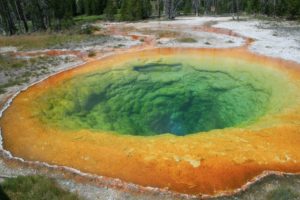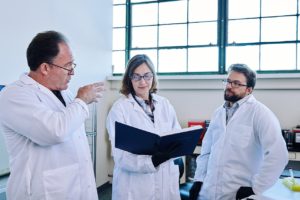Business Profile: CinderBio
In 2012, CinderBio was founded by internationally recognized biochemists Steven M. Yannone, Ph.D., and Jill O. Fuss, Ph.D. to commercialize ultra-stable enzymes using technology developed from their research. The enzymes are made from the extreme microbes that thrive in hot volcanic water, creating a new class of enzymes for industrial applications. Earlier this year, CinderBio relocated its facilities from Berkeley to Gate510 at 1933 Davis Street in San Leandro.
CinderBio’s decision to move to Gate510 presented an opportunity to occupy a dedicated space while still surrounded with a community of other companies doing interesting work. Gate510 is within their price range, conveniently located, and also allows for future expansions as the business grows.
CinderBio enzymes are unique—they can operate in conditions that no other enzymes can, which opens up a number of previously unexplored applications. They are made from microbes that come from Yellowstone and live in hot acidic pools, so they thrive in nearly boiling acid. CinderBio has been able to take gene sequences and make them into enzymes that are extraordinarily stable.
Enzymes are naturally occurring molecules that act as catalysts to activate or speed up biochemical reactions; their use in industry is commonplace and usually beneficial to the environment since they can replace or reduce the use of chemicals.
Use of CinderBio’s enzymes also cuts down on chemical waste. Chemical wastewater cannot be reclaimed and instead often has to be trucked off-site. Replacing these chemicals with biodegradable CinderBio enzymes makes that wastewater reclaimable, of particular importance given the drought climate in California. This technology helps make food processing more sustainable and could be used for any food product that goes in a container and ends up on a shelf.
Enzymes are already a $4.2 billion industry, and that’s expected to keep growing at the rate of 7 percent a year as scientists find more enzymes and apply them in more situations. But furthermore, in field trials, using CinderBio’s enzymes to do the cleaning in place of chemicals has proven successful beyond expectations. Water usage was reduced by almost 30 percent and the enzymes removed contaminants much faster and much more effectively than expected. In 2018, CinderBio partnered with Chobani, taking part in the yogurt company’s incubator program. These savings of water, time, and removal of wastewater are significant enough on their own, but the added energy savings and environmental benefits cements CinderBio as a regional leader in industrial economic development and sustainability.










Leave a Reply